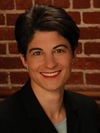Wendy Seltzer: Difference between revisions
+ref |
m →Career: +inwiki |
||
| (9 intermediate revisions by 3 users not shown) | |||
| Line 4: | Line 4: | ||
|born = | |born = | ||
|country = USA | |country = USA | ||
|email = | |email = firstname @ lastname . org | ||
|website = | |website = https://wendy.seltzer.org/ | ||
|twitter = wseltzer | |twitter = wseltzer | ||
|mastodon = @wseltzer@infosec.exchange | |||
|facebook = | |facebook = | ||
|linkedin = | |linkedin = http://www.linkedin.com/in/wendyseltzer | ||
|userbox = {{Template:UBX- | |userbox = {{Template:UBX-ICANNBOARD-P}} {{Template:UBX-GNSO-P}} {{Template:UBX-ALAC-P}} | ||
}} | }} | ||
'''Wendy Seltzer''' is | '''Wendy Seltzer''' is Principal Identity Architect, Tucows. She previously served as Strategy Lead and Counsel to the World Wide Web Consortium, focusing on security, privacy, and interoperability through Web standards. She is a former member of the [[ICANN Board]] as an [[ALAC]] liaison and North American representative on the [[GNSO|GNSO Council]] from [[NCSG]]. | ||
==ICANN== | ==ICANN== | ||
Wendy has had the dubious good fortune of involvement with [[ICANN]] since its founding | Wendy has had the dubious good fortune of involvement with [[ICANN]] since its founding when she helped the Berkman Center to webcast ICANN's first board meeting. She is a member of the [[Technical Experts Group]]. Previously, she served as a member of the [[ICANN Board]] as an At-Large Advisory Committee ([[ALAC]]) liaison from October 2007 to October 2009,<ref name="board">[http://www.icann.org/en/groups/board Board], ICANN. Retrieved November 9, 2015.</ref> as well as the [[NCUC|Non-Commercial Users Constituency]]; and as a North American representative of the NCSG to the [[GNSO|GNSO Council]]. | ||
==Career== | ==Career== | ||
Wendy is a | Wendy Seltzer is Principal Identity Architect, Tucows. She previously served as Strategy Lead and Counsel to the World Wide Web Consortium, focusing on security, privacy, and interoperability through Web standards. As a visiting Fellow with Yale Law School's Information Society Project, she researched openness in intellectual property, innovation, privacy, and free expression online. As a Fellow with Harvard's Berkman Center for Internet & Society, Wendy founded the Chilling Effects Clearinghouse (now Lumen Database), helping to measure the impact of legal takedown demands on the Internet. She serves on the Board of Directors of The Tor Project, promoting privacy and anonymity research, education, and technology. She seeks to improve technology policy in support of user-driven innovation and communication. | ||
Wendy has been a Fellow with Princeton University's Center for Information Technology Policy and the University of Colorado's Silicon Flatirons Center for Law, Technology, and Entrepreneurship in Boulder. She has taught Intellectual Property, Internet Law, Antitrust, Copyright, and Information Privacy at American University Washington College of Law, Northeastern Law School, and Brooklyn Law School and was a Visiting Fellow with the Oxford Internet Institute, teaching a joint course with the Said Business School, Media Strategies for a Networked World. Previously, she was a staff attorney with online civil liberties group Electronic Frontier Foundation, specializing in intellectual property and First Amendment issues, and a litigator with Kramer Levin Naftalis & Frankel. | |||
She has also served as a non-voting task force member and fellow with Harvard University's [[Berkman Center for Internet and Society]].<ref>[http://www.foxnews.com/story/2007/03/21/icann-weighs-anonymizing-domain-name-registrations.html ICANN Weighs Anonymizing Domain-Name Registrations] (March 21, 2007), Fox News. Retrieved November 9, 2015.</ref> Wendy blogged at Legal Tags. | |||
==Related== | |||
* [[Whois Task Force]] | |||
==Resources== | ==Resources== | ||
| Line 29: | Line 37: | ||
{{reflist}} | {{reflist}} | ||
[[Category: | [[Category:Cybersecurity Workers]] | ||
[[Category:NGO Worker]] | |||
[[Category:Former ICANN Board]] | |||
[[Category:Former GNSO Council]] | |||
[[Category:Former ALAC Member]] | |||
[[Category:Technical Liaison Group]] | |||
Latest revision as of 13:10, 11 June 2024
 |
 | ||
| Country: | USA | ||
| Email: | firstname @ lastname . org | ||
| Website: | |||
| LinkedIn: | |||
| Twitter: | |||
| |||
Wendy Seltzer is Principal Identity Architect, Tucows. She previously served as Strategy Lead and Counsel to the World Wide Web Consortium, focusing on security, privacy, and interoperability through Web standards. She is a former member of the ICANN Board as an ALAC liaison and North American representative on the GNSO Council from NCSG.
ICANN[edit | edit source]
Wendy has had the dubious good fortune of involvement with ICANN since its founding when she helped the Berkman Center to webcast ICANN's first board meeting. She is a member of the Technical Experts Group. Previously, she served as a member of the ICANN Board as an At-Large Advisory Committee (ALAC) liaison from October 2007 to October 2009,[1] as well as the Non-Commercial Users Constituency; and as a North American representative of the NCSG to the GNSO Council.
Career[edit | edit source]
Wendy Seltzer is Principal Identity Architect, Tucows. She previously served as Strategy Lead and Counsel to the World Wide Web Consortium, focusing on security, privacy, and interoperability through Web standards. As a visiting Fellow with Yale Law School's Information Society Project, she researched openness in intellectual property, innovation, privacy, and free expression online. As a Fellow with Harvard's Berkman Center for Internet & Society, Wendy founded the Chilling Effects Clearinghouse (now Lumen Database), helping to measure the impact of legal takedown demands on the Internet. She serves on the Board of Directors of The Tor Project, promoting privacy and anonymity research, education, and technology. She seeks to improve technology policy in support of user-driven innovation and communication.
Wendy has been a Fellow with Princeton University's Center for Information Technology Policy and the University of Colorado's Silicon Flatirons Center for Law, Technology, and Entrepreneurship in Boulder. She has taught Intellectual Property, Internet Law, Antitrust, Copyright, and Information Privacy at American University Washington College of Law, Northeastern Law School, and Brooklyn Law School and was a Visiting Fellow with the Oxford Internet Institute, teaching a joint course with the Said Business School, Media Strategies for a Networked World. Previously, she was a staff attorney with online civil liberties group Electronic Frontier Foundation, specializing in intellectual property and First Amendment issues, and a litigator with Kramer Levin Naftalis & Frankel.
She has also served as a non-voting task force member and fellow with Harvard University's Berkman Center for Internet and Society.[2] Wendy blogged at Legal Tags.
Related[edit | edit source]
Resources[edit | edit source]
- Wendy Seltzer at Wikipedia
- Wendy Seltzer - Keep the Core Neutral @ ICANN (July 13, 2007), IP Justice via YouTube
- Internet Policymakers May Punt on Privacy Issue by Brian Krebs (October 30, 2007), Washington Post
- ICANN Board Approves Censorship Policy for Domain Names Based on Morality: 2 Board Members Speak Against It (June 26, 2008), IP Justice
References[edit | edit source]
- ↑ Board, ICANN. Retrieved November 9, 2015.
- ↑ ICANN Weighs Anonymizing Domain-Name Registrations (March 21, 2007), Fox News. Retrieved November 9, 2015.
